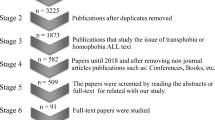Abstract
Many employees with strong religious convictions find themselves living in two separate worlds: the sacred private world of family and church where they can express their faith freely and the secular public world where religious expression is strongly discouraged. We examine the origins of sacred/secular divide, and show how this division is an outcome of modernism replacing Christianity as the dominant worldview in western society. Next, we make the case that guiding assumptions (or faith) is inherent in every worldview, system of thought, or religion and also show that scientific reason can never be a comprehensive or totalizing meaning system, particularly in the realm of ethics. The underlying assumptions of the sacred/secular divide are seriously questioned which has implications for employees who desire to integrate faith and career. Finally, we offer possibilities for individuals and corporate entities to integrate the personal and sacred with the institutional and secular.
Similar content being viewed by others
References
Ariely, D. (2010). Predictably irrational: The hidden forces that shape our decisions. New York, NY: Harper Perennial.
Berger, P. (1977). Facing up to modernity: Excursions in society, politics, and religion. New York, NY: Basic Books.
Bloom, A. (1987). The closing of the American mind. New York, NY: Simon & Schuster, Inc.
Brammer, S., Williams, G., & Zinkin, J. (2007). Religion and attitudes to corporate social responsibility in a large cross-country sample. Journal of Business Ethics, 71, 229–243.
Calkins, M. (2000). Recovering religion’s prophetic voice for business ethics. Journal of Business Ethics, 23, 339–352.
Chase, K. R. (2004). Christian perspectives on business ethics: Faith, profit, and decision-making. Business & Professional Ethics Journal, 23(4), 3–12.
Colson, C. W., & Pearcey, N. R. (1999). How now shall we live? Wheaton, IL: Tyndale House Publishers.
Cotton, R. 1996. Business and Ethics. http://www.probe.org/site/c.fdKEIMNsEoG/b.4227383/k.FE33/Business_and_Ethics.htm.
Daniels, D., Franz, R. S., & Wong, K. (2000). A classroom with a worldview: Making spiritual assumptions explicit in management education. Journal of Management Education, 24(5), 540–561.
Dewey, J. (1922). Reconstruction in philosophy. New York, NY: Henry Holt and Company.
Ferrell, O. C., & Gresham, L. G. (1985). A contingency framework for understanding ethical decision-making in marketing. Journal of Marketing, 49(3), 87–96.
Forsyth, D. R. (1992). Judging the morality of business practices: The influence of personal moral philosophies. Journal of Business Ethics, 11(5, 6), 461–470.
Fort, T. L. (1996). Religious belief, corporate leadership, and business ethics. American Business Law Journal, 33(3), 451–471.
Habermas, J. (2010). An awareness of what is missing: Faith and reason in a post-secular age. New York, NY: Polity.
Hunt, S. D. (1991). Modern marketing theory: Critical issues in the philosophy of marketing science. Cincinnati, OH: South-Western Publishing Co.
James, W. (1907). Pragmatism. New York, NY: Longmans, Green & Company.
Kant, I. 1871/2008. The critique of pure reason, trans. Marcus Weigelt and Max Muller, (Penguin Classics: New York, NY).
Kaufmann, S. A. (2010). Reinventing the sacred: A new view of science reason and religion. New York, NY: Basic Books.
Kim, D., Fisher, D., & McCalman, D. (2009). Modernism, Christianity, and business ethics: A worldview perspective. Journal of Business Ethics, 90(1), 115–121.
Kuhn, T. S. (1996). The structure of scientific revolutions (3rd ed.). Chicago, IL: University of Chicago Press.
Latour, B. (1993). We have never been modern, trans. Catherine Porter. Cambridge, MA: Harvard University Press.
Mattox, R. (1978). The Christian employee. South Plainfield, NJ: Bridge Publishing, Inc.
Nash, L. (1994). Believers in business: Resolving the tension between Christian faith, business ethics, competition and our definitions of success. Nashville, TN: Thomas Nelson.
Peabody, L. (1974). Secular work is full-time service. Fort Washington, PA: Christian Literature Crusade.
Pearcey, N. R. (2004). Total truth: Liberating Christianity from its cultural captivity. Wheaton, IL: Crossway Books.
Rossouw, G. J. (1994). Business ethics: Where have all the Christians gone? Journal of Business Ethics, 13(7), 557–570.
Ryken, L. (1986). Worldly saints. Grand Rapids, MI: Zondervan Publishing House.
Schaeffer, F. A. (1982). Escape from reason, in the complete works of Francis A. Schaeffer (Vol. 1). Wheaton, IL: Crossway.
Sire, J. (1997). The universe next door: A basic worldview catalog. Dowers Grove, IL: Intervarsity Press.
Starke, R., & Finke, R. (2000). Acts of faith: Explaining the human side of religion. Berkeley, CA: University of California Press.
Swatos, W. H., Jr., & Christiano, K. J. (1999). Secularization theory: The course of a concept. Sociology of Religion, 60, 209–228.
Veith, G. E. (1994). Postmodern times: A Christian guide to contemporary thought and culture. Wheaton, IL: Crossway Books.
Walsh, B., & Middleton, J. (1984). The transforming vision. Dowers Grove, IL: Intervarsity Press.
Yaman, H. R. (2003). Skinner’s naturalism as a paradigm for teaching business ethics: A discussion from tourism. Teaching Business Ethics, 7(2), 107–122.
Author information
Authors and Affiliations
Corresponding author
Rights and permissions
About this article
Cite this article
Kim, D., McCalman, D. & Fisher, D. The Sacred/Secular Divide and the Christian Worldview. J Bus Ethics 109, 203–208 (2012). https://doi.org/10.1007/s10551-011-1119-z
Received:
Accepted:
Published:
Issue Date:
DOI: https://doi.org/10.1007/s10551-011-1119-z




